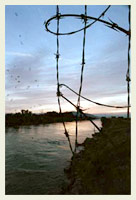
Image: Lina Katz
EJIDO MERIDA, Mexico —
In the dusty yard outside her home in this small farming community, Marina Martinez washes clothes in a plastic bucket, with water drawn from an outdoor spigot that is her family’s only plumbing. Beyond their small house, on the other side of a listing picket fence, lie the cotton and wheat fields where her husband works.
Ten miles north, just across the US-Mexico border, water rushes through the All-American Canal from the Colorado River to California’s Imperial Valley, one of the most productive agricultural regions of the United States. For decades, water from the canal has also irrigated the fields and filled the washtubs of thousands of Mexicans like Martinez who live in Baja’s arid north. But soon, that water will run dry.
Every year, according to the federal Interior Department, 67,700 acre-feet of water — enough to satisfy the demands of about 135,000 California families — seeps through the dirt bottom of the All-American Canal. (An acre-foot is the amount of water required to cover an acre of land one foot deep.) Underground, between layers of rock and dirt, it percolates south into Mexico, where it is pumped from wells. Farm communities like Martinez’s have relied on the water for decades since the canal was built in 1940.
But now, with urban growth in the southwestern US making water ever scarcer, California has launched a conservation plan that includes lining the leaky All-American Canal and an ancillary canal with concrete. The $200 million project will ensure that the water saved from leaking out flows instead to Los Angeles, San Diego and other southern California cities — and away from the more than 30,000 people across the border who have come to depend on it.
In Ejido Merida, people rely almost entirely on well water for irrigation, bathing, washing, and even drinking. If there were no water, and no work in the fields, Martinez says she and her husband would have to try to moving to the nearby border city of Mexicali. “I could clean houses and my husband could be a security guard,” she guesses. “But we would rather stay here. There’s nothing like being at home.”
Ejido president Miguel Bañuelos, however, is afraid that a time may come when there is no choice but to leave. “Without the water, all agricultural activity could be over for this ejido,” he says. And farming is the valley’s only source of employment.
Seepage from the All-American Canal accounts for 10 to 12 percent of the supply to the Mexicali Valley aquifer, but it is by far the purest source, diluting the saltier reserves of groundwater. No one yet knows whether losing the canal seepage will make the water too salty to use, or pumping too expensive to continue. But in 1998 Alfonso Andrés Cortez-Lara, a researcher from Mexicali’s Colegio de la Frontera Norte, surveyed farmers in the valley and found 90 percent expected their expenses to rise with the canal lining. Eighty-six percent said they would yield fewer crops and earn less money. In addition, concludes Cortez-Lara, the lining could cut from 10 to 20 percent of the arable land out of the valley’s approximately $230 million farm industry.
The Mexican farmers have no legal right to the water they stand to lose. The aptly named All-American Canal cuts west just before the Colorado River crosses the border into Mexico, taking with it a fifth of the river’s water. What seeps out from the canal is Colorado River water allocated to California by the Treaty of 1944. As guaranteed by the same treaty, Mexico still gets its share of the river’s surface water — 1.5 million acre-feet per year compared to 4.4 million for California and millions more for other states.
The seepage from the All-American Canal, therefore, has been a 60-year bonus to Mexico, so lining it does not violate the treaty, say officials from the International Boundary and Water Commission, the binational agency that settles water disputes between the US and Mexico.
Still, the Mexican government objects to the project. “It will be very harmful for Mexico,” says Moisés Domínguez, a representative from Mexico’s National Water Commission. The government has filed a complaint with IBWC.
The commission, however, is not trying to stop the project, says Robert Ybarra, secretary of foreign affairs for the American branch of IBWC. “There is no difference of opinion. Those waters are US waters. The issue is one of impact to Mexico.”
To offset damages there, Ybarra says American and Mexican members of the commission are discussing “goodwill offers,” such as delivering some of Mexico’s Colorado River water through a turnout in the All-American Canal. With less distance to travel and the benefit of the canal’s de-silting process, the water would be of better quality than what Mexico gets now. But that won’t necessarily help the Mexicali Valley farmers.
Meanwhile, the Imperial Irrigation District, which operates the canal and will build the lining, is moving forward, says IID’s water department manager Michael King. Construction can begin as soon as California and the IID work out final details, and the state releases the funding, says Charles Keene, a water management chief with California’s Department of Water Resources. If all goes according to plan, that should be in early 2003.
Keene says he’s aware of the impact the project will have on the Mexicali Valley, but says California’s dwindling water supplies leave the state no choice. Since the federal government won’t allow California to take any more Colorado River water, he says, “we have to be able to conserve where appropriate, put it to the best use, and use it more efficiently.”
Across the border in Mexicali, Cortez-Lara says, “We understand these tensions in California. But we have another problem: There is only one source for both sides.”















